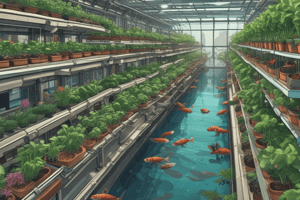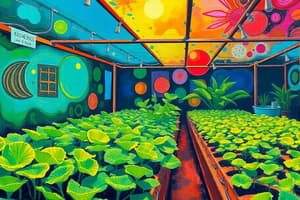Podcast
Questions and Answers
What is aquaponics?
What is aquaponics?
- A system that combines hydroponics and aquaponics
- A system that combines aquaculture and hydroponics (correct)
- A system that combines hydroponics and aeroponics
- A system that combines aquaculture and aeroponics
What are the three primary live components of an aquaponic system?
What are the three primary live components of an aquaponic system?
- Fish, plants, and worms
- Plants, snails, and bacteria
- Plants, fish, and bacteria (correct)
- Fish, snails, and bacteria
What is the most common freshwater fish raised in aquaponics?
What is the most common freshwater fish raised in aquaponics?
- Catfish
- Trout
- Salmon
- Tilapia (correct)
What is nitrification in an aquaponic system?
What is nitrification in an aquaponic system?
What are the five main inputs to an aquaponic system?
What are the five main inputs to an aquaponic system?
What is the recommended fish biomass in an aquaponic system?
What is the recommended fish biomass in an aquaponic system?
What is the advantage of using organic fish feeds in an aquaponic system?
What is the advantage of using organic fish feeds in an aquaponic system?
What is the advantage of aquaponic systems over conventional farming in terms of water usage?
What is the advantage of aquaponic systems over conventional farming in terms of water usage?
What is the disadvantage of aquaponic systems?
What is the disadvantage of aquaponic systems?
Flashcards are hidden until you start studying
Study Notes
Aquaponics: A System that Combines Aquaculture with Hydroponics
-
Aquaponics is a system that combines aquaculture (raising aquatic animals in tanks) with hydroponics (cultivating plants in water) by feeding nutrient-rich aquaculture water to hydroponically grown plants.
-
The size, complexity, and types of foods grown in an aquaponic system can vary as much as any system found in either distinct farming discipline.
-
The development of modern aquaponics is often attributed to the various works of the New Alchemy Institute and the works of Dr. Mark McMurtry et al. at the North Carolina State University.
-
The first aquaponics research in Canada was a small system added onto existing aquaculture research at a research station in Lethbridge, Alberta.
-
Aquaponics consists of two main parts: the aquaculture part for raising aquatic animals and the hydroponics part for growing plants.
-
Plants, fish (or other aquatic creatures), and bacteria are the three primary live components of an aquaponic system.
-
Many plants are suitable for aquaponic systems, including green leaf vegetables with low to medium nutrient requirements, tomatoes, cucumbers, and peppers.
-
Freshwater fish are the most common aquatic animal raised using aquaponics due to their ability to tolerate crowding, with tilapia being the most popular fish for home and commercial projects.
-
Nitrification, the aerobic conversion of ammonia into nitrates, is one of the most important functions in an aquaponic system as it reduces the toxicity of the water for fish.
-
Plants are grown in hydroponics systems, with their roots immersed in the nutrient-rich effluent water.
-
The five main inputs to the system are water, oxygen, light, feed given to the aquatic animals, and electricity to pump, filter, and oxygenate the water.
-
Organic fish feeds may prove to be a viable alternative that relieves the concern of ongoing depletion of wild fish stocks.
-
A few minerals and micronutrients can be added to improve plant growth, including iron, potassium, magnesium, calcium, and boron.Aquaponics: A Sustainable Farming Method
-
Wastewater and sludge contain adequate nutrients for aquaponic crop needs; potassium is generally deficient requiring fertilization.
-
Aquaponic systems recirculate and reuse water effectively, using approximately 2% of the water used in conventional farming.
-
Aquaponic systems can be highly energy efficient with careful design.
-
Fish biomass should not exceed 0.5 lbs/gallon to reduce stress from crowding and promote healthy growth.
-
Non-chemical methods such as physical barriers and biological control should be used to control pests.
-
Automation and monitoring systems have been developed for aquaponic systems.
-
Aquaponics offers a diverse and stable polyculture system that allows farmers to grow vegetables and raise fish at the same time.
-
Aquaponic systems are organic and pesticide-free, while also leaving a small environmental footprint.
-
Aquaponic systems are economically efficient due to low water usage, effective nutrient cycling, and needing little land to operate.
-
The economic viability of aquaponic businesses must be determined case by case.
-
Double Recirculating Aquaponic Systems (DRAPS) can use synthetic fertilizers without hurting the fish and can provide the same level of production as conventional hydroponic systems while reducing fertilizer usage by 23.6%.
-
Aquaponics requires a high degree of knowledge in multiple disciplines, a lack of financing opportunities, and the general public's lack of understanding.
Studying That Suits You
Use AI to generate personalized quizzes and flashcards to suit your learning preferences.




